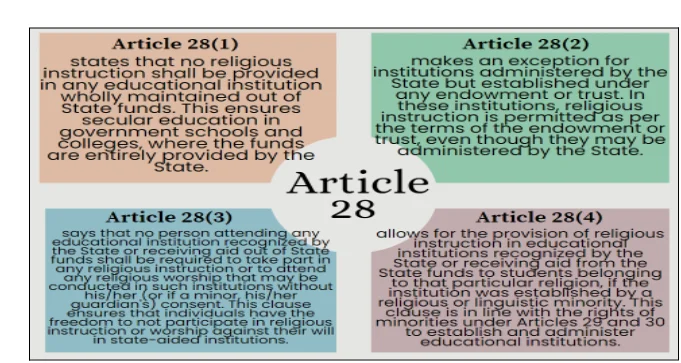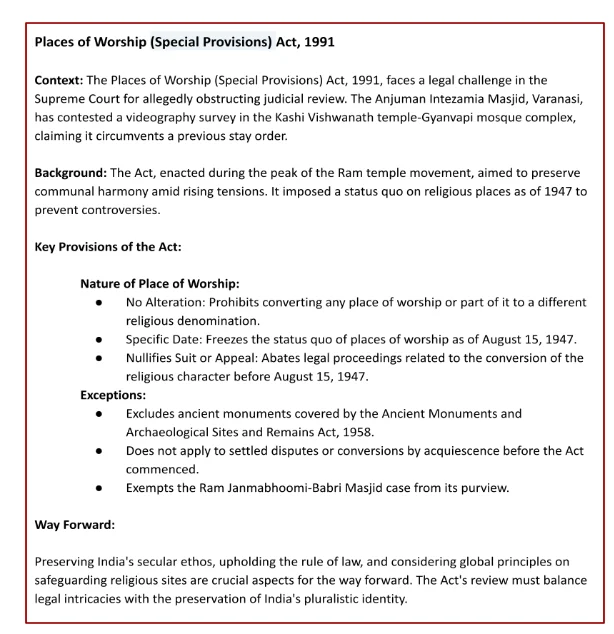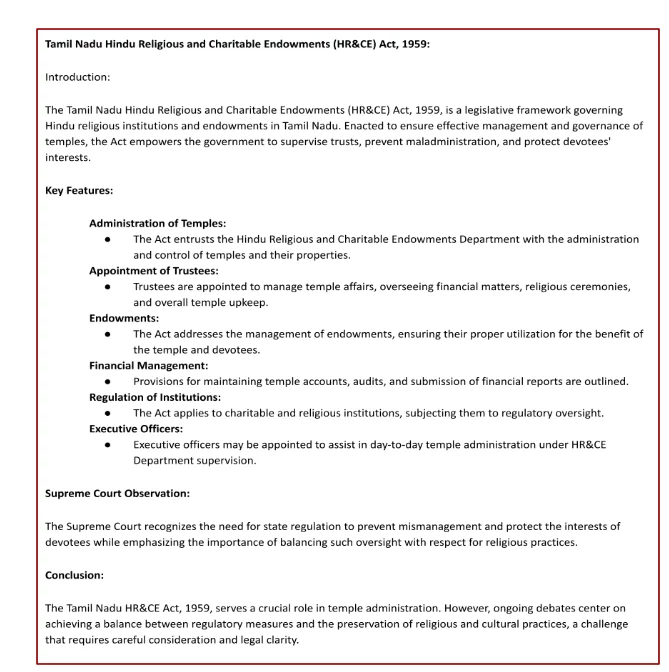The Right to Freedom of Religion in the Indian Constitution, covered under Articles 25 to 28, ensures that individuals can freely practice, profess, and propagate their religion. This includes freedom from tax imposition for religious promotion and the right to opt out of religious instruction in educational institutions. Key legal provisions and judgments further define and protect these freedoms, balancing them with state interests and secular principles.
Overview of Right to Freedom of Religion: Articles 27 and 28
Article 27: Freedom as to payment of taxes for promotion of any particular religion
- Article 27: secures the freedom from the imposition of taxes for the purposes of promotion of any specific religion.
- Prohibition on Taxation for Specific Religions: It lays down that no individual shall be forced to pay taxes that are specifically levied to fund or support any specific religion or religious group.
- Government Use of Public Funds: In other words, the government must not use public funds, which are accumulated through taxation, to advance or sustain any specific religious denomination.
- State Neutrality: This provision forbids the state from favoring, patronizing, and supporting any particular religion over another.
- Tax Utilization: In that regard, tax can be utilized for the promotion or maintenance of all religions.
Enroll now for UPSC Online Course
Important Judgements
In Prafull Goradia v. Union of India: The petitioner challenged the allocation of government subsidies for Haj pilgrims.
-
- He claimed this act breached Article 27 of the Indian Constitution.
- Article 27 bars the state from forcing citizens to fund specific religious activities through taxes.
- The petitioner’s argument hinged on the tax being used for a religious purpose.
- He pointed out that this tax was collected from people of various faiths, not solely from Muslims.
- This, according to the petitioner, constituted a violation of Article 27’s protections.
- The Supreme Court ruled that,Haj Subsidy does not violate Article 27:
-
- Justifying its stand, the court stated that Subsidy does not represent a “substantial part” of government finances.
- Article 27 breaches occur when taxes directly promote a religion.
- Haj subsidy deemed too small a portion of total taxes to constitute such a promotion.
- Union of India v/s Rafiq Shaik Bikhan, 2012
-
- Appealed to phase out Haj subsidy,
- By 2018, Haj subsidy was phased out.
- Thus, giving need based support to every religion.
- Distinction Between Taxes and Fees in Religious Institutions: This article prohibits the imposition of taxes but not fees since the objective of a fee is to manage the secular aspect of religious institutions, rather than to support and sustain the religion itself.
- Thus, fees can be charged to the pilgrims for providing them with some special service or safety precautions.
- Similarly, a religious endowment may be subject to fees for regulation expenditures.
Article 28: Freedom as to attendance at religious instruction or religious worship in certain educational institutions
- Article 28: of the Indian Constitution deals with the freedom as to attendance at religious instruction or religious worship in educational institutions.
- Scope of Article 28: This article has four clauses that clarify the extent to which religious education can be imparted in state-funded or state-recognized institutions.
- Exemption from Religious Participation: Anyone enrolled in an educational institution recognized by the State or receives aid out of State funds is not obliged to participate in any religious teachings or ceremonies within that institution unless they consent to do so.
- For minors, such participation requires the approval of their guardian.
- Categories of Educational Establishments: Therefore, Article 28 differentiates among four categories of educational establishments:
- State-maintained institution.
- State-administered institution but established under any endowment or trust.
- State-recognized institution
- Institution receiving aid from the state.

Aruna Roy v/s Union of India, 2002
- Case Challenge Against Textbook Content and Curriculum: In this case, a notable challenge was made against the content of school textbooks and the National Curriculum Framework for School Education developed by the National Council of Educational Research and Training (NCERT).
- The petitioners contended that the content in the textbooks and curriculum was communal rather than secular, thereby violating the constitutional principles of secularism and the right to education.
- Argument Based on Article 28(1): The argument was based on Article 28(1), which prohibits the imparting of ‘religious instruction’ in educational institutions fully funded by the state.
- Study of Religion: However, it does not prohibit the introduction of the study of religion in state educational institutions, including those wholly or partly aided by the state.
- The study of religion is considered necessary for the unity and integrity of India.
- Study of Religion: However, it does not prohibit the introduction of the study of religion in state educational institutions, including those wholly or partly aided by the state.
- Concerns Raised and Implications: This case raised significant concerns about the interpretation of historical facts, religious neutrality in education, and the state’s responsibility to ensure that educational content aligns with the constitutional mandate of secularism.
- Distinction Between Religious Instruction and Education: A crucial distinction was established between providing religious instruction, which includes teaching specific rituals, observances, customs, and traditions, and offering education about these traditions.
- This differentiation highlights the fine line between instruction and education, emphasizing that religious instruction is not synonymous with religious education or vice versa.


Enroll now for UPSC Online Course
| Must Read | |
| Current Affairs | Editorial Analysis |
| Upsc Notes | Upsc Blogs |
| NCERT Notes | Free Main Answer Writing |
Conclusion
Articles 25 to 28 of the Indian Constitution provide robust protections for religious freedom, ensuring that no one is compelled to support a religion financially or participate in religious activities against their will.
- However, the balancing act between individual rights and state interests continues through various legal frameworks and judicial interpretations, highlighting the ongoing need to uphold secularism while respecting religious diversity.
Sign up for the PWOnlyIAS Online Course by Physics Wallah and start your journey to IAS success today!
| Related Articles | |
| RIGHT TO FREEDOM OF RELIGION: ARTICLE- 25-28 | National Curriculum Framework for School Education (NCF-SE) |
| Secularism | Taxation in India |

 GS Foundation
GS Foundation Optional Course
Optional Course Combo Courses
Combo Courses Degree Program
Degree Program









